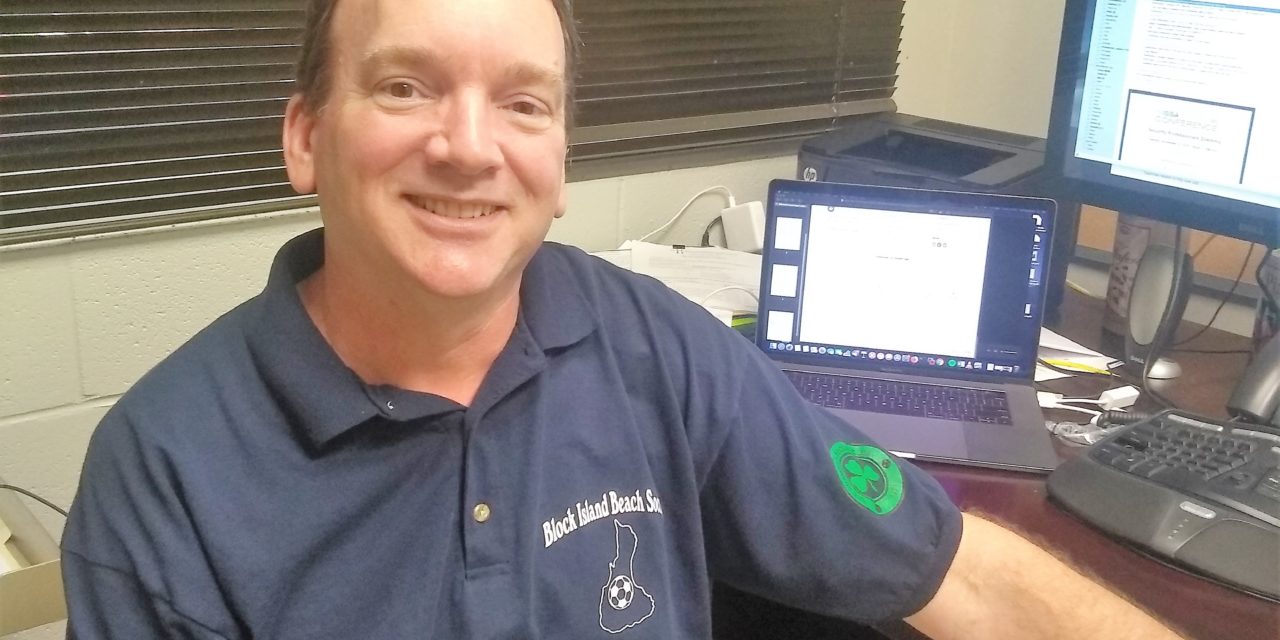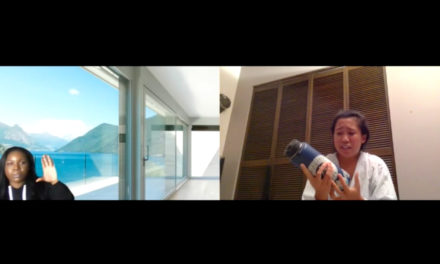By Katlin Cilliers | Staff Writer
Ask a Professor is a regular feature in which Kapiʻo News will highlight the real-life careers and jobs that stem from areas of study at Kapiʻolani Community College.
Professor Hal Corcoran has worked in the field of Information Technology – IT – since 1995. He obtained most of his professional experiences on the East Coast where he got a job fresh out of college with the University of Rhode Island, where he graduated with his bachelor’s and master’s degree. The KCC professor explained that Information Technology is intertwined in virtually every industry nowadays, which requires from its professionals a zest for adapting and learning new technologies.
Corcoran currently teaches Networking and Cyber Security at KCC, where he’s worked since 2008. He shared some of the ins and outs of his experiences in the IT field as a help desk, network and server administrator.
What did you do in help desk?
At the help desk I was the Macintosh [guy]. Help desk was anything that came through the door. People would call, and come in with a problem, like ‘I’m having a problem with my mac’ or they could come in and say ‘How do I do this?’ or ‘How do I do that?’ … So, it was a great learning experience. I recommend to my students, you know? … [It] might not be the most fun job, because, you know, it’s always new things coming at you, so it can be a little stressful. But it’s such a great learning experience, because you have to deal with all different kinds of problems, you never know what it’s going to be from one day to the next.
What was a typical day in help desk?
I’d sit in my office, and people would either call or come to my office … we had help desk hours. And it could be anything from ‘How do I build a website on mac?’ to ‘I’m getting this error on my mac.’ … But it’s such a great learning experience, because you have to deal with all different kinds of problems, you never know what it’s going to be from one day to the next.
What did you do as a server administrator?
I got hired to manage the main web servers and email servers for the University [of Rhode Island.] I did that for nine years. And that was, day in and day out writing programs on the servers. Also, checking logs and monitoring the servers to make sure they were operating correctly, you might get calls from the help desk, if someone’s having a problem, say, with their email and those people weren’t able to solve it, they’d call me as the ‘email server administrator,’ see if I could help.
What happened after those nine years?
I decided that I wanted to move to Hawaiʻi, so I started to apply for positions here and I had interviews … [Eventually] I got hired as a network administrator for Honolulu Community College [as a] Network and Unix Administrator. And so, I worked there for three years, from like 2006 to 2009. So that was on networking, which I liked because I got out around the campus a lot, … I was going to the switches and routers were installed, and the network closets in the different buildings, and you get to meet different people; you’re just moving around campus, you’re not just kind of sitting in one place and doing programming on your computer.
What’s the difference between a server administrator and a network manager?
So, a network manager is managing the switches and the routers and the wiring that create the network, and the WiFi access point, and kind of the … infrastructure that create the network. The server administrator is managing the specific servers, so like the web servers, the e-mail servers that sit on the network.
The network is a lower-level infrastructure that the servers use to communicate with each other and to communicate around the internet. It’s just a different level of infrastructure. Probably from a non-IT standpoint, it looks like the same thing, but it’s really you know, a little bit … it’s a different area and quite as different expertise and skills.
How does that work in practice?
As the network admin, I was configuring switches, configuring routers, and those are … you have to go out to where they’re located. Every building has a work closet where those devices are located, and you have to physically go … you have to plug in with the special type of cable to your laptop and you can do configurations on it.
As far as configuring a server, you just sit in your office, you connect to the server from your computer, and you do the configurations that way. The network is more localized. You have to go out to the location, whereas the server is more … you don’t have to actually go to the server, you do most things remotely.
What does the job market look like in terms of salaries and trending fields?
So, almost any industry that you think of now has some IT people that are helping to support it. So, when you go into IT you don’t necessarily have to go, you know, into an IT company, right? You could be working for a company that makes donuts or something. But they would have an IT person who manages their network or [the] software that they use to keep track of customers. IT is almost everywhere now, it’s ubiquitous.
Yeah, so, our focus here in this program has always been supporting small businesses, and we think that that requires more of a generalist, more of a broad knowledge, someone who can do a lot of things, who can learn new technologies as they come along, because in IT everything you learn is essentially obsolete when you graduate because it changes so fast.
So, two years, you know you’re using some completely different type of, or at least different versions of the same programs, because things are moving so fast. So what we’re really trying to focus on is to give people the foundations and the backbone where people can kind of learn technology so they can learn new technologies.
What can students expect from both working in smaller, non-tech companies and IT companies’ salaries?
What’s hot right now is cybersecurity. Everyone’s hiring people with a background in cybersecurity. It’s very hot. And I’ve heard anecdotal reports of students graduating and being hired for six figures. The really star students. But, you know, that might be the exception.
As far as entry-level positions … you might end up with Super Geeks or Geek Squad; I’m not really sure what they pay, but it’s certainly much less than that, probably going by 40k range, maybe 30 or 40k range. It’s kind of a help desk thing.
It’s a wide, wide range of salaries, and I guess in the hot areas you tend to get the higher salaries, but even in the other areas, that’s [an] entry level, you know, very little or no experience. And just building a few years of experience, those salaries go up quite sharply. If you specialize in certain areas, if you specialize in programming or networking, once you’re more specialized then you can usually commend a higher salary as well.
Would you say that salary-wise, it’s better to focus on exclusively IT, tech companies?
It’s different to different people. It depends on what their interest is. … We’ve had some people, we’ve had some students who are actually accountants, they start in accounting, but they want to be able to support the technologies and whatever they go through, so they come to IT classes and they think that gives them a strong, it makes them stronger candidates. … Now, because IT is just so blended into everything, there’s a lot of overlapping, you know? Maybe I have IT skills, but it also combines some other specialized skills for some industr[ies].
What are the best and worst aspects of your job?
I have to say that they’re both the same thing: dealing with the customers. Dealing with the people, some people … it can be very rewarding when you help a person, solve a technical problem and they’re very happy and thankful. On the other hand, people … sometimes we interact with people when they’re very frustrated, they’re having problems with their computer, so they’re very frustrated and they can be difficult to deal with, though.
Technology is always the same. The same command produces the same output on the computer all the time. So, that’s, you know, that’s easy to deal with. At least for me … it’s always dealing with the personalities, the customers that was both the best and the worst.
What profile would thrive following a career in IT?
It could be a wide range. We have … you can be one of those people, just 3 o’clock in the morning programming in the darkroom by themselves and not really dealing with people, and up to you know, someone who … [works in] help desk who’s dealing with people face-to-face. So, there’s a wide range of opportunities for different personality types in IT.
What would you say to a student who wishes to pursue a career in IT but is not quite sure yet?
I would tell them to try a few classes. I was not an IT major initially, until I took my first IT class and I fell in love with it and switched to it. … So, I’d say try and see if that’s something that you’re happy doing or not. We have a few different areas, so I’d say try different areas, we have different classes in database, programming, and networking/help desk and cybersecurity. And some students like to specialize in one of those areas, and some like to kind of be the jack of all trades and learn about all of them.
[To read previous Ask a Professor features, click here.]







How’s it going, thekapionews?
Don’t you wish you had a chance at becoming Instagram popular?
If you are like me, you have scrolled through Instagram, wondering “how do so many friggin people get so rich and famous”?
Picture this: You arise early Friday, even before your alarm goes off.
Roll over, check the cellphone.
Flipping to Instagram.
Wow, you think, Over 561 likes on a single picture.
You put your soft slippers on and head to the kitchen for some coffee. After putting on the kettle, you pull out your phone again.
Bam! Another 20 likes.
Here comes another one. This time it’s not a like but a message from one of your followers. They congratulate you on your success and let you know they absolutely love your content.
As you read it, you begin to grin. It is a super sweet-looking person, and they love your posts.
As you sip your tea, you start typing up your response. But then your cell buzzes.
Oops, another hit. But no time to write back—you’ve got to hit the gym.
Let’s stop the simulation there. Most people have a hard time getting what they want in life. People can hardly force themselves to eat a good breakfast.
I’m here to show you how to take the reigns of your Instagram.
Now, what if you increased your popularity by 100%, or 1000%?
Truth is, it is not the most complicated thing in the world to get more. As an example, all the old pros use our website.
Automagically see tons of likes on your images just minutes after posting.
With this you’ve a big chance to be featured in the “Top Post” section.
And because we love you, we made testing things out as simple as kitchen-cooled apple crumble:
1. Click https://plantspace.pro
2. Put in your Instagram username.
3. Your 3 most recent uploads are getting 10 – 15 likes. Just like that.
Being a regular on that page will increase your growth 10x, easy. But if you want the fame, you’ve got to reach for it. Are you ready?
Chow until next time